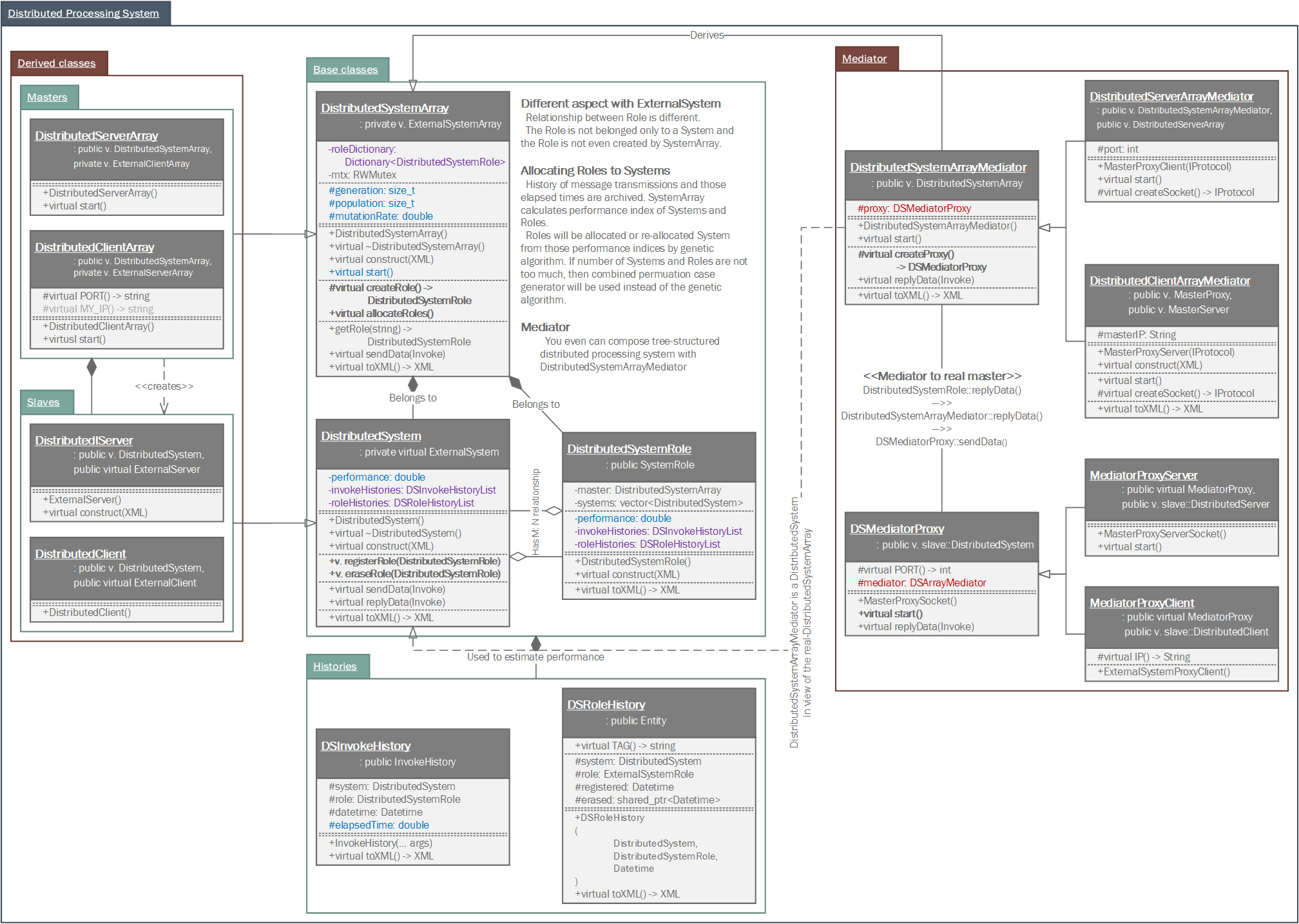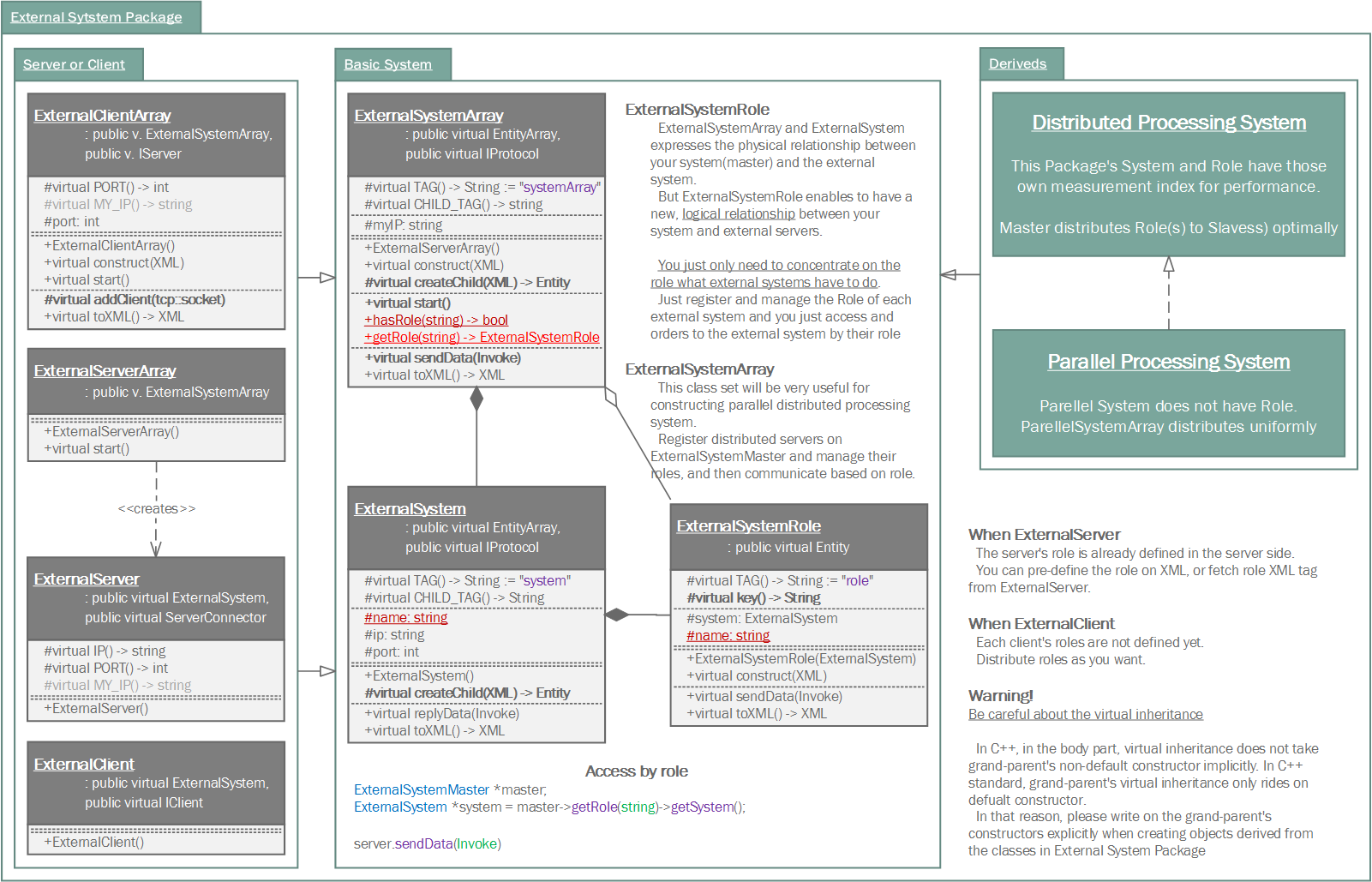|
Samchon Framework for CPP
1.0.0
|
|
Samchon Framework for CPP
1.0.0
|
An array of distributed system drivers. More...
#include <DistributedSystemArray.hpp>

Public Member Functions | |
| DistributedSystemArray () | |
| Default Constructor. More... | |
| virtual void | construct (std::shared_ptr< library::XML >) override |
| Construct data of the Entity from an XML object. More... | |
| virtual void | start () override |
| Start interaction. More... | |
| virtual void | allocateRoles () |
| Allocate roles to each distributed processing system. More... | |
| auto | hasRole (const std::string &) const -> bool |
| Test whether has a role. More... | |
| auto | getRole (const std::string &) const -> std::shared_ptr< DistributedSystemRole > |
| Get a role. More... | |
| virtual auto | toXML () const -> std::shared_ptr< library::XML > override |
| Get an XML object represents the EntityGroup. More... | |
 Public Member Functions inherited from samchon::protocol::ExternalSystemArray Public Member Functions inherited from samchon::protocol::ExternalSystemArray | |
| ExternalSystemArray () | |
| Default Constructor. More... | |
| auto | hasRole (const std::string &) const -> bool |
| Test whether has a role. More... | |
| auto | getRole (const std::string &) const -> std::shared_ptr< ExternalSystemRole > |
| Get a role. More... | |
| virtual void | sendData (std::shared_ptr< Invoke >) override |
| Sends an Invoke message to related ExternalSystem(s). More... | |
| virtual void | replyData (std::shared_ptr< Invoke >) override |
| Handle replied Invoke message. More... | |
| virtual auto | TAG () const -> std::string override |
| A tag name when represented by XML. More... | |
| virtual auto | CHILD_TAG () const -> std::string override |
| A tag name of children. More... | |
 Public Member Functions inherited from samchon::protocol::EntityGroup< _Container, _ETy, T > Public Member Functions inherited from samchon::protocol::EntityGroup< _Container, _ETy, T > | |
| EntityGroup () | |
| Default Constructor. More... | |
| auto | has (const std::string &key) const -> bool |
| Indicates whether a container has an object having the specified identifier. More... | |
| auto | get (const std::string &key) -> value_type & |
| Access the element by specified identifier(key). More... | |
| auto | get (const std::string &key) const -> const value_type & |
| Access the const element by specified identifier(key). More... | |
 Public Member Functions inherited from samchon::protocol::Entity Public Member Functions inherited from samchon::protocol::Entity | |
| Entity () | |
| Default Constructor. More... | |
| virtual auto | key () const -> std::string |
| Get a key that can identify the Entity uniquely. More... | |
 Public Member Functions inherited from samchon::protocol::IEntityGroup Public Member Functions inherited from samchon::protocol::IEntityGroup | |
| IEntityGroup () | |
| Default Constructor. More... | |
 Public Member Functions inherited from samchon::protocol::IProtocol Public Member Functions inherited from samchon::protocol::IProtocol | |
| IProtocol () | |
| Default Constructor. More... | |
Protected Member Functions | |
| virtual auto | createRole (std::shared_ptr< library::XML >) -> DistributedSystemRole *=0 |
| Factory method of a DistributedSystemRole. More... | |
 Protected Member Functions inherited from samchon::protocol::EntityGroup< _Container, _ETy, T > Protected Member Functions inherited from samchon::protocol::EntityGroup< _Container, _ETy, T > | |
| virtual auto | createChild (std::shared_ptr< library::XML >) -> entity_type *=0 |
| Factory method of a child Entity. More... | |
Protected Attributes | |
| Dictionary< std::shared_ptr< DistributedSystemRole > > | roleDictionary |
| A dictionary of role objects. More... | |
| struct library::GAParameters | gaParameters |
| A structure of parameters for genetic algorithm. More... | |
An array of distributed system drivers.
DistributedSystemArray class is an ExternalSystemArray and an abstract class containing and managing distributed system drivers within framework of master. The DistributedSystemArray class allocates DistributedSystemRole objects to DistributedSystem objects for optimization.
Unlike the ExternalSystemRole class which is dependent on an ExternalSystem, DistributedSystemRole is not dependent on a DistributedSystem and even can be allocated to multiple DistributedSystem objects. Allocation of DistributedSystemRole(s) to DistributedSystem(s) is determined by estimation of performance index pursuing best distribution. If number of DistributedSystem and DistributedSystemRole objects is not a lot, optimize by combined permuation algorithm. Else the objects are a lot, the allocation will be optimized by genetic algorithm.

ExternalSystemArray is an abstract class containing and managing external system drivers.
Also, ExternalSystemArray can access to ExternalSystemRole(s) directly. With the method, you can use an ExternalSystemRole as "logical proxy" of an ExternalSystem. Of course, the ExternalSystemRole is belonged to an ExternalSystem. However, if you access an ExternalSystemRole from an ExternalSystemArray directly, not passing by a belonged ExternalSystem, and send an Invoke message even you're not knowing which ExternalSystem is related in, the ExternalSystemRole acted a role of proxy.
It's called as "Proxy pattern". With the pattern, you can only concentrate on ExternalSystemRole itself, what to do with Invoke message, irrespective of the ExternalSystemRole is belonged to which ExternalSystem.

Definition at line 39 of file DistributedSystemArray.hpp.
| DistributedSystemArray::DistributedSystemArray | ( | ) |
Default Constructor.
Definition at line 15 of file DistributedSystemArray.cpp.
|
overridevirtual |
Construct data of the Entity from an XML object.
Constructs the EntityGroup's own member variables only from the input XML object.
Do not consider about constructing children Entity objects' data in EntityGroup::construct(). Those children Entity objects' data will constructed by their own construct() method. Even insertion of XML objects representing children are done by abstract method of EntityGroup::toXML().
Constructs only data of EntityGroup's own.
Overrides the construct() method and fetch data of member variables from the XML.
By recommended guidance, data representing member variables are contained in properties of the put XML object.
| xml | An xml used to construct data of entity |
Reimplemented from samchon::protocol::EntityGroup< _Container, _ETy, T >.
Reimplemented in samchon::protocol::master::DistributedSystemArrayMediator, samchon::protocol::master::DistributedClientArrayMediator, and samchon::protocol::master::DistributedClientArray.
Definition at line 20 of file DistributedSystemArray.cpp.
References samchon::protocol::EntityGroup< _Container, _ETy, T >::construct(), createRole(), and roleDictionary.

|
protectedpure virtual |
Factory method of a DistributedSystemRole.
| An | XML object represents the role. |
Referenced by construct().

|
overridevirtual |
Start interaction.
An abstract method starting interaction with external systems.
If external systems are servers, starts connection to them, else clients, opens a server and accepts the external systems. You can addict your own procudures of starting drivers, but if you directly override method of abstract ExternalSystemArray, be careful about virtual inheritance.
Implements samchon::protocol::ExternalSystemArray.
Reimplemented in samchon::protocol::master::DistributedSystemArrayMediator, samchon::protocol::master::DistributedClientArrayMediator, samchon::protocol::master::DistributedClientArray, samchon::protocol::master::DistributedServerArrayMediator, and samchon::protocol::master::DistributedServerArray.
Definition at line 40 of file DistributedSystemArray.cpp.
References allocateRoles().

|
virtual |
Allocate roles to each distributed processing system.
Allocates DistributedSystemRole objects to Distributedsystem objects. The allocation will be done when:
Definition at line 44 of file DistributedSystemArray.cpp.
Referenced by start().

| auto DistributedSystemArray::hasRole | ( | const std::string & | ) | const -> bool |
Test whether has a role.
| name | An identifier of an DistributedSystemRole |
Definition at line 54 of file DistributedSystemArray.cpp.
References samchon::protocol::Entity::key(), and roleDictionary.

| auto DistributedSystemArray::getRole | ( | const std::string & | ) | const -> std::shared_ptr<DistributedSystemRole> |
Get a role.
| name | An identifier of an DistributedSystemRole |
Definition at line 58 of file DistributedSystemArray.cpp.
References samchon::protocol::Entity::key(), and roleDictionary.

|
overridevirtual |
Get an XML object represents the EntityGroup.
Archives the EntityGroup's own member variables only to the returned XML object.
Do not consider about archiving children Entity objects' data in EntityGroup::toXML(). Those children Entity objects will converted to XML object by their own toXML() method. The insertion of XML objects representing children are done by abstract method of EntityGroup::toXML().
Archives only data of EntityGroup's own.
Returns an XML object that can represents the Entity containing member variables into properties.
A member variable (not object, but atomic value like number, string or date) is categorized as a property within the framework of entity side. Thus, when overriding a toXML() method and archiving member variables to an XML object to return, puts each variable to be a property belongs to only an XML object.
Don't archive the member variable of atomic value to XML::value causing enormouse creation of XML objects to number of member variables. An Entity must be represented by only an XML instance (tag).
| Standard Usage | Non-standard usage abusing value |
|---|---|
| <memberList> <member id='jhnam88' name='Jeongho+Nam' birthdate='1988-03-11' /> <member id='master' name='Administartor' birthdate='2011-07-28' /> </memberList> | <member> <id>jhnam88</id> <name>Jeongho+Nam</name> <birthdate>1988-03-11</birthdate> </member> |
Reimplemented from samchon::protocol::EntityGroup< _Container, _ETy, T >.
Reimplemented in samchon::protocol::master::DistributedSystemArrayMediator, samchon::protocol::master::DistributedClientArrayMediator, and samchon::protocol::master::DistributedClientArray.
Definition at line 66 of file DistributedSystemArray.cpp.
References roleDictionary, and samchon::protocol::EntityGroup< _Container, _ETy, T >::toXML().

|
protected |
A dictionary of role objects.
Definition at line 49 of file DistributedSystemArray.hpp.
Referenced by construct(), getRole(), hasRole(), and toXML().
|
protected |
A structure of parameters for genetic algorithm.
Definition at line 54 of file DistributedSystemArray.hpp.